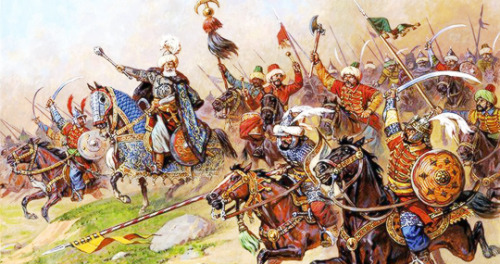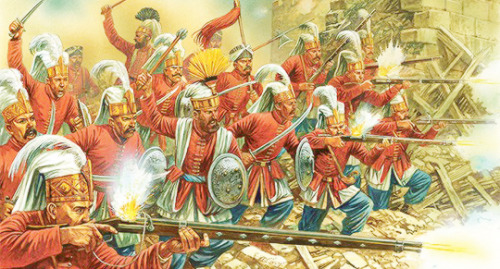sultankosem: ♛ Ottoman’s army: The Jannisaries (Ottoman Turkish: يڭيچرى yeniç
sultankosem:♛ Ottoman’s army: The Jannisaries (Ottoman Turkish: يڭيچرى yeniçeri)The Janissaries were created by the ottoman Sultan Murad I in 1383, and included two notable institutions: military organization of the Janissaries and the civil service, which has been aptly called the “Ruling Institution” by Professor Lybyer.These institutions evolved from the Ottoman system of takeing Christian kids during invasions of countries (known as “devşirme”) after instituting them and having been converted to Islam and given the finest training, they became the elite forces of the army and the most disciplined and dedicated fighting machine the world had seen up until that time. The more able of the jannisaries were enrolled in the palace corps of pages and trained to become Pashas and officials, they may even end up being grand viziers (prime ministers) As is the case of Sultan Suleiman’s famous grand vizier Ibrahim Pasha or Viziers (ministers) in the state bureaucracy, the Ruling Institution. The remainder were given a military education and became members of the famous Janissary corps, jannisaries reached the height of their strenght during the time of Sultan Suleiman Kanuni, and recognized in the 15th and 16th centuries as the best trained and most effective soldiers of Europe. Janissaries trained under strict discipline with hard labor and in practically monastic conditions in acemi oğlan (“rookie” or “cadet”) schools, where they were expected to remain celibate. As a symbol of their devotion to the order, Janissaries wore special hats called “börk”. These hats also had a holding place in front, called the “kaşıklık”, for a spoon. This symbolized the “kaşık kardeşliği”, or the “brotherhood of the spoon”, which reflected a sense of comradeship among the Janissaries who ate, slept, fought and died together.For all practical purposes Janissaries belonged to the Sultan carrying the title kapıkulu (“door slave”) indicating their collective bond with the Sultan, and they were regarded as the protectors of the throne, the Sultan and his family. Janissaries were taught and trained to consider the corpsas their home and family, and the Sultan as their de facto father, they regarded him with great respect, love and admiration.In return for their loyalty and their fervor in war, Janissaries gained privileges and benefits. They received a cash salary, received booty during wartime and enjoyed a high living standard and respected social status.The image of the “Terrible Turk,” suggest Nicolle and Hook, has hindered objective European accounts of the Janissaries. However, a writer in the late sixteenth century suggested a number of reasons for their success, including their “devotion to war, taking the offensive, a lack of interest in fixed fortifications, well trained soldiers, strong discipline, use of ruses as well as direct attack, good commanders and no wasting time on amusements.” Another commentator “added the cleanliness of their camps, where there was neither gambling, drinking nor swearing, and where there were proper latrines and an efficient corps of water-carriers who followed the army into battle and helped the wounded”. Christian rulers such as John Hunyadi having fought against the Janissaries saw the advantage of a regular, well trained army and formed their own. Many historians also believe that one of the biggest reasons of the system’s demise of the Ottoman Empire, is giving the janissaries the right to marry and enroll their children in the corps during the 18th century, which lef to very few of them continuing to live in the barracks.The Jannisaries remain the best trained and strongest soldiers the world had known during the 14th until the 17th centry, and the most effective system Ottomans have ever created. -- source link
#history#turkish history#14th century

